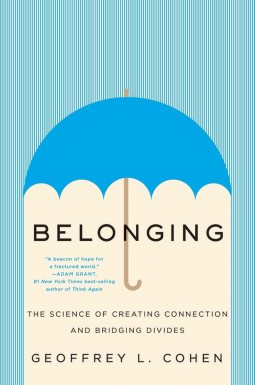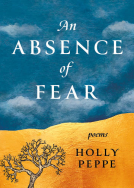
Belonging
The Science of Creating Connection and Bridging Divides
by Geoffrey L. Cohen
This title was previously available on NetGalley and is now archived.
Send NetGalley books directly to your Kindle or Kindle app
1
To read on a Kindle or Kindle app, please add kindle@netgalley.com as an approved email address to receive files in your Amazon account. Click here for step-by-step instructions.
2
Also find your Kindle email address within your Amazon account, and enter it here.
Pub Date 13 Sep 2022 | Archive Date 31 Aug 2022
Talking about this book? Use #Belonging #NetGalley. More hashtag tips!
Description
Subject Category: Psychology / Social Psychology
“This is perhaps the richest book on belonging you’ll ever read.… The inspiration one draws from every page of this book is an enhanced sense of what is possible. It revives the very thing we need most in these times: hope.” —Claude M. Steele, author of Whistling Vivaldi
We live in enormously divisive times. From politics to race, religion, gender, and class, division runs rampant. In 2020, 40 percent of each political party said that supporters of the opposing party were “downright evil.” In 2019, hate crimes reached a ten-year high in the United States. One in five Americans suffers from chronic loneliness. How did we become so alienated? Why is our sense of belonging so undermined? What if there were a set of science-backed techniques for navigating modern social life that could help us overcome our differences, create empathy, and forge lasting connections even across divides?
In Belonging, Stanford University professor Geoffrey L. Cohen applies his and others’ groundbreaking research to the myriad problems of communal existence and offers concrete solutions for improving daily life. We all feel a deep need to belong, but most of us don’t fully appreciate that need in others. Often inadvertently, we behave in ways that threaten others’ sense of belonging. Yet small acts that establish connection, brief activities such as reflecting on our core values, and a slew of practices that Cohen defines as “situation-crafting” have been shown to lessen political polarization, improve motivation and performance in school and work, combat racism in our communities, enhance health and well-being, and unleash the potential in ourselves and in our relationships.
Belonging is essential for managers, educators, parents, administrators, caregivers, and everyone who wants those around them to thrive.
About the Authors: Geoffrey L. Cohen is professor of psychology and the James G. March Professor of Organizational Studies in Education and Business at Stanford University.
Advance Praise
"This book is a beacon of hope for our fractured times. A leading expert on belonging offers an engaging analysis of the science and practice of breaking down the barriers between people and building bridges to a more respectful world." - Adam Grant, #1 New York Times bestselling author of Think Again
"Belonging is a masterpiece of social psychology—well-researched, highly engaging, and fundamentally useful to anyone who wants to bring out the best in themselves and in others, whether at school, at home, or in the workplace. At a time of so much social disruption and disconnection, Geoffrey L. Cohen has provided a very helpful and profoundly hopeful guide, rooted in well-tested psychological principles, that we urgently need. Everyone should read this book!" - Beverly Daniel Tatum, author of Why Are All the Black Kids Sitting Together in the Cafeteria? and Other Conversations About Race
"No one before Geoffrey L. Cohen has pulled together all the research relevant to diversity and inclusion in a single volume, helping us to understand belonging through a social psychological lens. The book is masterful, showcasing highly effective interventions. An inspiration!" - Peter Salovey, president of Yale University
"Belonging combines rich science, compelling stories, and beautiful prose to illuminate the social psychological principles behind the need to belong and how to foster belonging and connection in a fractured world. Reading this book will yield insights into your own motivation and behavior and will help you understand the source of many pressing problems of our time." - Sonja Lyubomirsky, author of The How of Happiness
"This book shines piercing illumination on one of today’s most timely topics—the causes and consequences of belonging to modern social groups. Importantly, it maps scientifically grounded routes to minimizing the harmful consequences while optimizing the positive ones. The world needs this book." - Robert B. Cialdini, PhD, author of Influence and Pre-Suasion
"An exhilarating book, filled with actionable insights about making the world around you better." - Dacher Keltner, author of The Power Paradox
Available Editions
| EDITION | Hardcover |
| ISBN | 9781324006183 |
| PRICE | US$30.00 (USD) |
Featured Reviews
 Shelly H, Reviewer
Shelly H, Reviewer
I found this book interesting and informative. In a world where it seems divisiveness is strong, despite all the speak on inclusiveness, this is an apropos topic. Amongst certain groups there seems to be a very strong inclination toward “you are either like us or you are a part of a maligned out-group.” As a person who pretty much accepts people and their differences, I must admit, I am confounded by the forces that propel individuals to have in- and out-group mentalities in which the out-group is perceived as a threat or an entity to be avoided at all costs.
Belonging is written by a Stanford social psychology professor who has studied alienation and its wide-ranging effects which include social pain, decreased well-being, and decreased potential. Cohen has also researched how to bridge divides, overcome automatic bias, and widen our circles of belonging. As the author points out, even slight adjustments in our thoughts and behaviors toward others may foster increased individual and collective well-being, alleviate social tension, and create occasions to connect and grow. This book is not a socio-political call to action, but rather a gentle reminder that we all have the potential to positively impact our own circles by fostering a spirit of inclusiveness in our every-day attitudes and actions.
This book is insightful, informative, and relevant. I wish books like these were required reading in high school and/or college.
Readers who liked this book also liked:
Rosemary Gladstar
Home & Garden, Outdoors & Nature, Religion & Spirituality


















